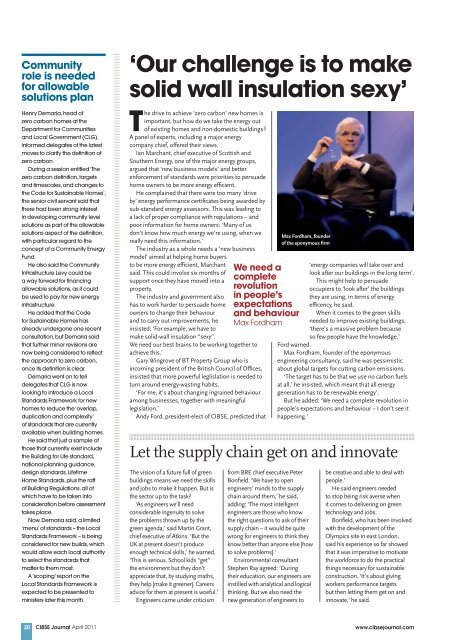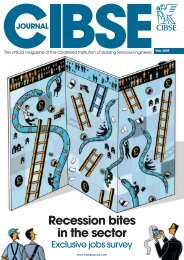You also want an ePaper? Increase the reach of your titles
YUMPU automatically turns print PDFs into web optimized ePapers that Google loves.
Community<br />
role is needed<br />
for allowable<br />
solutions plan<br />
Henry Demaria, head of<br />
zero carbon homes at the<br />
Department for Communities<br />
and Local Government (CLG),<br />
informed delegates of the latest<br />
moves to clarify the definition of<br />
zero carbon.<br />
During a session entitled ‘The<br />
zero carbon definition, targets<br />
and timescales, and changes to<br />
the Code for Sustainable Homes’,<br />
the senior civil servant said that<br />
there had been strong interest<br />
in developing community level<br />
solutions <strong>as</strong> part of the allowable<br />
solutions <strong>as</strong>pect of the definition,<br />
with particular regard to the<br />
concept of a Community Energy<br />
Fund.<br />
He also said the Community<br />
Infr<strong>as</strong>tructure Levy could be<br />
a way forward for financing<br />
allowable solutions, <strong>as</strong> it could<br />
be used to pay for new energy<br />
infr<strong>as</strong>tructure.<br />
He added that the Code<br />
for Sustainable Homes h<strong>as</strong><br />
already undergone one recent<br />
consultation, but Demaria said<br />
that further minor revisions are<br />
now being considered to reflect<br />
the approach to zero carbon,<br />
once its definition is clear.<br />
Demaria went on to tell<br />
delegates that CLG is now<br />
looking to introduce a Local<br />
Standards Framework for new<br />
homes to reduce the ‘overlap,<br />
duplication and complexity’<br />
of standards that are currently<br />
available when building homes.<br />
He said that just a sample of<br />
those that currently exist include<br />
the Building for Life standard,<br />
national planning guidance,<br />
design standards, Lifetime<br />
Home Standards, plus the raft<br />
of Building Regulations, all of<br />
which have to be taken into<br />
consideration before <strong>as</strong>sessment<br />
takes place.<br />
Now, Demaria said, a limited<br />
‘menu’ of standards – the Local<br />
Standards Framework – is being<br />
considered for new builds, which<br />
would allow each local authority<br />
to select the standards that<br />
matter to them most.<br />
A ‘scoping’ report on the<br />
Local Standards Framework is<br />
expected to be presented to<br />
ministers later this month.<br />
20<br />
‘Our challenge is to make<br />
solid wall insulation sexy’<br />
The drive to achieve ‘zero carbon’ new homes is<br />
important, but how do we take the energy out<br />
of existing homes and non-domestic buildings?<br />
A panel of experts, including a major energy<br />
company chief, offered their views.<br />
Ian Marchant, chief executive of Scottish and<br />
Southern Energy, one of the major energy groups,<br />
argued that ‘new business models’ and better<br />
enforcement of standards were priorities to persuade<br />
home owners to be more energy efficient.<br />
He complained that there were too many ‘drive<br />
by’ energy performance certificates being awarded by<br />
sub-standard energy <strong>as</strong>sessors. This w<strong>as</strong> leading to<br />
a lack of proper compliance with regulations – and<br />
poor information for home owners: ‘Many of us<br />
don’t know how much energy we’re using, when we<br />
really need this information.’<br />
The industry <strong>as</strong> a whole needs a ‘new business<br />
model’ aimed at helping home buyers<br />
to be more energy efficient, Marchant<br />
said. This could involve six months of<br />
support once they have moved into a<br />
property.<br />
The industry and government also<br />
h<strong>as</strong> to work harder to persuade home<br />
owners to change their behaviour<br />
and to carry out improvements, he<br />
insisted: ‘For example, we have to<br />
make solid-wall insulation “sexy”.<br />
We need our best brains to be working together to<br />
achieve this.’<br />
Gary Wingrove of BT Property Group who is<br />
incoming president of the British Council of Offices,<br />
insisted that more powerful leglislation is needed to<br />
turn around energy-w<strong>as</strong>ting habits.<br />
‘For me, it’s about changing ingrained behaviour<br />
among businesses, together with meaningful<br />
legislation.’<br />
Andy Ford, president-elect of <strong>CIBSE</strong>, predicted that<br />
The vision of a future full of green<br />
buildings means we need the skills<br />
and jobs to make it happen. But is<br />
the sector up to the t<strong>as</strong>k?<br />
‘As engineers we’ll need<br />
considerable ingenuity to solve<br />
the problems thrown up by the<br />
green agenda,’ said Martin Grant,<br />
chief executive of Atkins. ‘But the<br />
UK at present doesn’t produce<br />
enough technical skills,’ he warned.<br />
‘This is serious. School kids “get”<br />
the environment but they don’t<br />
appreciate that, by studying maths,<br />
they help [make it greener]. Careers<br />
advice for them at present is woeful.’<br />
Engineers came under criticism<br />
We need a<br />
complete<br />
revolution<br />
in people’s<br />
expectations<br />
and behaviour<br />
Max Fordham<br />
Max Fordham, founder<br />
of the eponymous firm<br />
Let the supply chain get on and innovate<br />
from BRE chief executive Peter<br />
Bonfield. ‘We have to open<br />
engineers’ minds to the supply<br />
chain around them,’ he said,<br />
adding: ‘The most intelligent<br />
engineers are those who know<br />
the right questions to <strong>as</strong>k of their<br />
supply chain – it would be quite<br />
wrong for engineers to think they<br />
know better than anyone else [how<br />
to solve problems].’<br />
Environmental consultant<br />
Stephen Ray agreed: ‘During<br />
their education, our engineers are<br />
instilled with analytical and logical<br />
thinking. But we also need the<br />
new generation of engineers to<br />
‘energy companies will take over and<br />
look after our buildings in the long term’.<br />
This might help to persuade<br />
occupiers to ‘look after’ the buildings<br />
they are using, in terms of energy<br />
efficency, he said.<br />
When it comes to the green skills<br />
needed to improve existing buildings,<br />
‘there’s a m<strong>as</strong>sive problem because<br />
so few people have the knowledge,’<br />
Ford warned.<br />
Max Fordham, founder of the eponymous<br />
engineering consultancy, said he w<strong>as</strong> pessimistic<br />
about global targets for cutting carbon emissions.<br />
‘The target h<strong>as</strong> to be that we use no carbon fuels<br />
at all,’ he insisted, which meant that all energy<br />
generation h<strong>as</strong> to be renewable energy’.<br />
But he added: ‘We need a complete revolution in<br />
people’s expectations and behaviour – I don’t see it<br />
happening.’<br />
be creative and able to deal with<br />
people.’<br />
He said engineers needed<br />
to stop being risk averse when<br />
it comes to delivering on green<br />
technology and jobs.<br />
Bonfield, who h<strong>as</strong> been involved<br />
with the development of the<br />
Olympics site in e<strong>as</strong>t London,<br />
said his experience so far showed<br />
that it w<strong>as</strong> imperative to motivate<br />
the workforce to do the practical<br />
things necessary for sustainable<br />
construction. ‘It’s about giving<br />
workers performance targets<br />
but then letting them get on and<br />
innovate,’ he said.<br />
<strong>CIBSE</strong> <strong>Journal</strong> April 2011 www.cibsejournal.com







